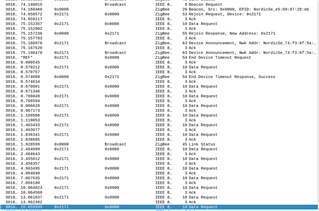I have been studying the power consumption of a prototype and observe that the end device is polling very frequently.
The data request polling is backing off for a while to about every 3 seconds, but suddenly (efter 15 seconds or so) the device starts polling every 200 ms or so.
If I disable the turbo polling mode then the polling will be every 500ms from start.
I'm wondering if you can help me put with some pointers to there I should start looking.
My goal is to poll once every ten seconds or so, and maybe a increased polling rate after any device activity to fetch pending commands.
My project is based on the multiprotocol doorlock example in sdk 4.0.0 and I am using SDK 16.0 to fill in the gaps to make it compile. Changes that I have meade includes moving the application out of the sdk-directory structure and I am using make and gcc to build it.
A log from wireshark: 
Power measurement:



